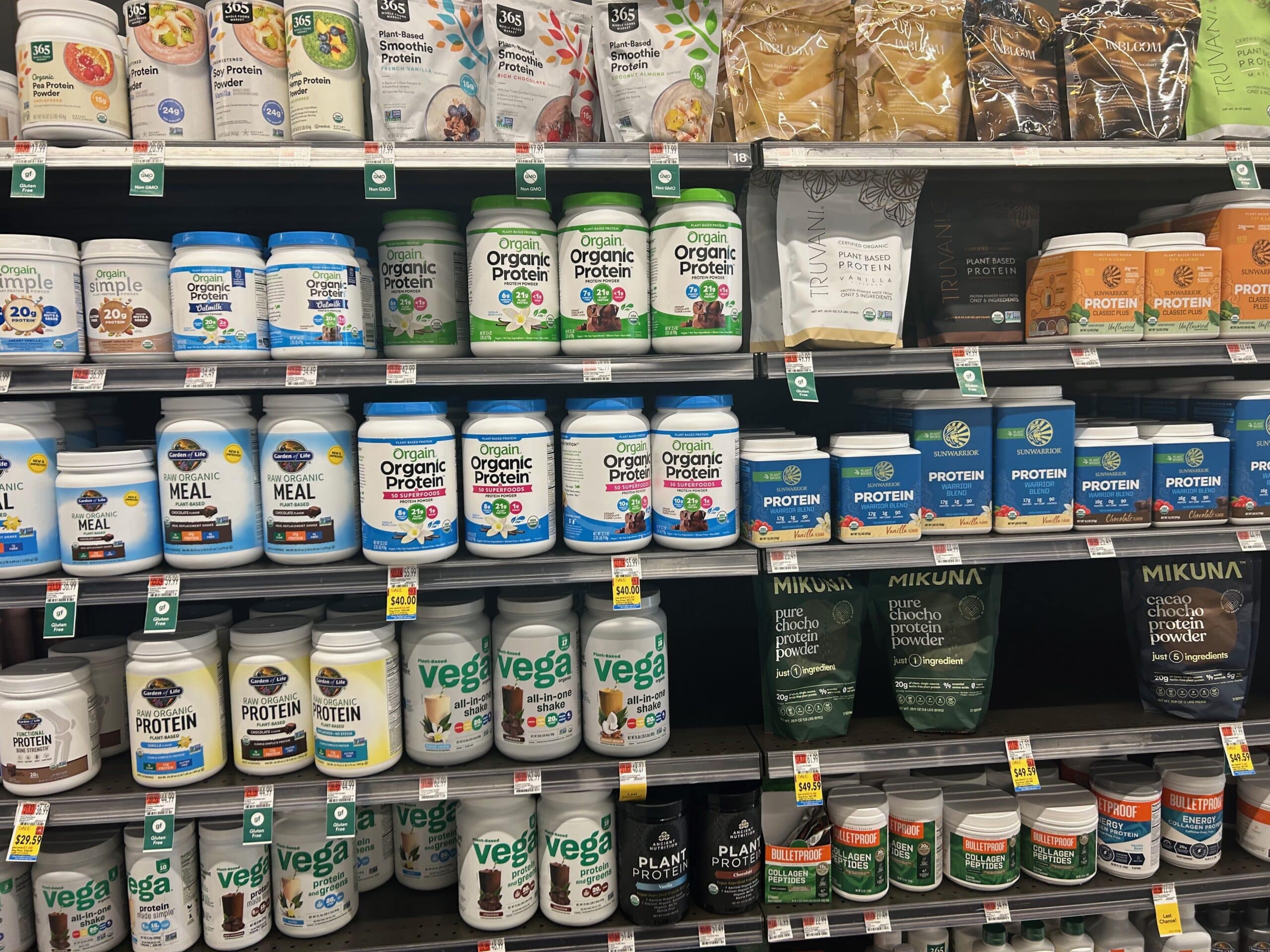Should You Consider a Protein Powder in Your Diet?
Store-bought protein powders are definitely not essential for most people. If you eat a balanced diet, even if you’re vegan, you can easily get enough protein from your meals. However, protein powders can still be a convenient and beneficial addition to your diet. This is especially true if you’re looking to build muscle. Or if you’re simply pressed for time! There are mornings when I just don’t feel like cooking eggs or prepping a big breakfast. That’s when a scoop of protein powder in a smoothie ensures that I can make it to lunch without excessive snacking.
The downside to protein powder is that it’s a highly processed food. Ingredients like soy protein, pea protein, or whey protein in powders and ready-made smoothies aren’t just whole foods that have been dried and ground into powder. Instead, these proteins are extracted from the foods in a lab, leaving you with the protein but without the other beneficial components of the whole food. For this reason, I don’t see protein powder as providing a health boost as much as providing a hack for getting protein without the effort of cooking real food.
(By the way: The recommended daily intake of protein is 0.84 grams per kilogram of body weight for adult males and 0.75 grams per kilogram for adult females. This works out to roughly 50 grams a day for most people. It’s best to distribute your protein intake across meals, aiming for about 20 grams per meal for optimal utilization.)
What is a Complete Protein?
Protein is composed of 20 amino acids, but only 11 of these are produced by the human body. We must get the other nine amino acids (called “essential amino acids”) from the foods we eat. When a food contains all 9 of these amino acids, it is called a “complete protein.” Animal proteins (meat, poultry, fish, eggs, dairy) are complete. And many plant-based proteins (for example quinoa, buckwheat, hempseed, blue-green algae, and soybeans) are also complete. All of the protein powders reviewed in this guide are complete proteins.
Can Protein Powder Be Harmful?
Dr. Hopkins found no compelling evidence that protein powder supplements can harm kidney function or bone health in healthy individuals, which was what I had commonly heard. (Those with pre-existing kidney conditions should monitor their protein intake under medical supervision). For anyone seeking more information on this, Dr. Hopkins recommends this article.
While we aren’t worried about most people taking too much protein via a powder, some protein powders are definitely not health foods, as you can see under Bad Stuff and Sneaky Stuff.
What Kind of Protein Powder is Healthiest?
Dr. Hopkins favors plant-based protein powders, which are well-digested and often contain fiber and digestive enzymes. He reasons that whey protein, derived from milk, may cause stomach issues due to lactose intolerance in some individuals. Perhaps the biggest plus to plant-based protein powder is environmental, a value he and I both consider when we shop.
On the other hand, animal-based protein powders tend to have fewer issues with heavy metal contamination, which is a major concern
Bottom line: When searching for brands we didn’t include or eliminate any brands based on whether they are plant- or animal-derived proteins. Here are two factors to consider when deciding between plant protein powders and whey protein
What Protein Powders Do Not Have Heavy Metals?
Heavy metals, such as lead, arsenic, cadmium, and mercury have been found in some protein powders, posing potential health risks if consumed regularly. These contaminants can enter protein powders through the soil where plant-based ingredients are grown or during the manufacturing process. To avoid heavy metals in your protein powder, choose products that are third-party tested for purity and safety. Additionally, rotating between different types of protein sources can help minimize the risk of exposure to any one contaminant.
A 2018 study by Clean Label Project showed that most protein powders are contaminated with heavy metals. A few salient points:
- Chocolate flavors tended to be higher in metals than vanilla or unflavored. This is likely because–as we know–cacao itself can be a significant source of metals.
- Remember that you can be exposed to heavy metals even from whole foods.
- Packaged foods tend to be more contaminated, as well as contaminated with things like BPA, and protein powder is a processed, packaged food.
- Overall, protein powders made from plant-based sources like soy or hemp were found to have higher levels of contamination compared to those made from whey (milk). This increased contamination in plant-based proteins is likely due to the plants’ natural tendency to absorb heavy metals from the soil.
- Three brands in our list have Clean Label Project certification, meaning they are tested and clear of unsafe levels of heavy metals: Puori, Ritual, and Wicked.
Different Types of Whey Protein
Animal-based protein powders typically use one of three types of whey protein:
- Whey Protein Concentrate: Contains about 70-80% protein by weight and has higher levels of lactose, fats, and carbohydrates. It may cause issues for those with lactose intolerance.
- Whey Protein Isolate: Undergoes additional processing to remove most of the lactose, fats, and carbohydrates, resulting in about 90% or higher protein content by weight. It contains minimal lactose, making it generally well-tolerated by people who are lactose intolerant.
- Whey Protein Hydrolysate: Further processed to break down the protein into smaller peptides, making it easier to digest and even lower in lactose than whey protein isolate.
Unless you are lactose intolerant, I recommend choosing protein powders with less processed whey (in other words, concentrate rather than isolate rather than hydrolysate) for the simple reason that less processing tends to be better when it comes to anything we eat. Most brands use whey protein isolate, but our top protein powder pick–Puori–uses whey protein concentrate.


































2 comments
ashleybeckham22
Have you heard of Ascent 100% Whey protein? The ingredient list is low without bad preservatives. My sister is quite “crunchy†and recommended it to me, and I’ve been using it for a couple months now.
alejandra.bracero
Have you tried/tested premix
Protein? I’m rather picky on taste and ingredients and have found the vegan vanilla checks most boxes.